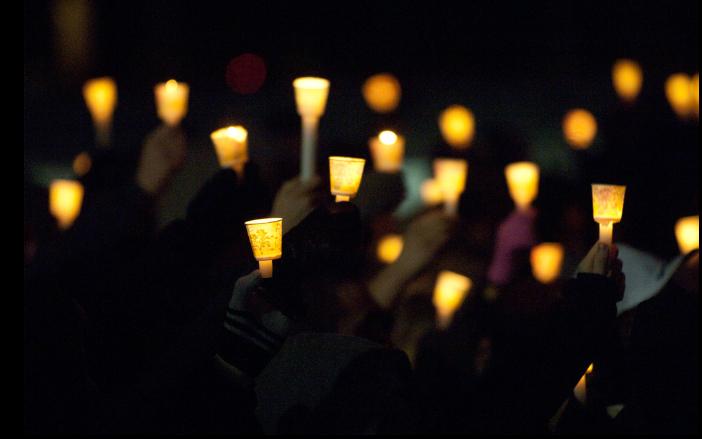Report on NIU shooter theorizes he lashed out against a surrogate family, had severe mental health issues
A candlelight vigil was held to remember the victims on the one-year anniversary of the shooting. Photo courtesy NIU.
March 26, 2010
It was meant to be another ordinary day of classes at Northern Illinois University, but when Steven Kazmierczak kicked open the door of room 101 in Cole Hall and opened fire, it changed the school, the students and the families of the victims forever.
Kazmierczak injured 21 people and killed five students–Gayle Dubowski, Catalina Garcia, Julianna Gehant, Ryanne Mace and Daniel Parmenter–before he turned the shotgun on himself.
It was, as NIU President John Peters said, “an incomprehensible act of violence.”
Kazmierczak’s motivations have been a mystery–until March 18, when NIU released a 322-page report on the incident, including several pages on Kazmierczak’s mental health issues, family, background and purchase of weapons.
“We realize this report brings neither comfort nor closure, but by sharing what we learned while dealing with this tragedy, we add information to the body of research on mass shootings that seem to increasingly plague our society,” Peters said.
Included in the report was a detailed psychological profile of Kazmierczak, who is described as “mentally ill, with a multiplicity of aggravating personality traits that contributed to his heinous crime.”
The report notes that Kazmierczak’s decision to stop taking medications for his mental illness partially led to his crime, and that he was described in vastly different ways, depending on the relationship he had with a person. Some professors described him as polite, conscienctious and likeable, while others described him as introverted, mistrustful and secretive. His sister described him as verbally abusive, and mental health professionals described him with words like anxious, depressed, obsessional, angry, paranoid, suicidal and schizophrenic.
He had made multiple previous suicide attempts–he tried to overdose on Tylenol in 1996, at age 16, slashed his wrists and overdosed on Ambien six months later, overdosed on Depakote six months after that and was hospitalized nine times before his eighteenth birthday for attempting suicide or making suicidal gestures. Throughout college, Kazmierczak continued to attempt suicide and was diagnosed with Schizoaffective Disorder, Schizoid Personality Traits and Psychosocial Stressors. He was paranoid and admitted hearing voices.
“Steven was heavily medicated with a combination of antidepressants, antipsychotic drugs and mood stabilizers,” the report states.
He stopped taking his medications around January 2001, but pretended to continue taking them because his caregivers were observing him.
“An understanding of the true nature of Steven Kazmierczak must reconcile both the complexity and contradiction that characterized this troubled young man,” wrote the investigating psychologist.
After graduating college summa cum laude, with a GPA of 3.88, Kazmierczak joined the military and then enrolled at NIU as a sociology graduate student, focusing on criminology.
Within the sociology department, Kazmierczak apparently found a home. The psychologist’s report suggests that he “flourished” in the “emotionally healing and supportive ‘family’ environment” at NIU, but then destabilized again after his mother’s death in 2006 and his break-up with his girlfriend in 2007.
Why Kazmierczak chose NIU for his rampage is still unknown.
“The investigation has revealed no evidence pointing to any specific reason for targeting Cole Hall or any of the individuals in that building at the time of the shooting,” the report stated.
Yet the report theorizes that Kazmierczak had come to regard NIU and the sociology department as his family, and that when the sociology department began to change its focus away from criminology, he felt he would have to transfer out of NIU and into a new program. The report theorized that Kazmierczak lashed out at his “surrogate family” in the sociology department, and that he targeted Cole Hall because it was “the birthplace of a new beginning for Kazmierczak,” where his first sociology classes had been held.
“By ending his life and the lives of other siblings (students) there, Kazmierczak would have come full circle,” the report theorized. “It was where he had flourished. Now it would be the setting for the grotesque end.”
The report also theorized that Kazmierczak may have chosen Valentine’s Day because it was the anniversary of an exam to become a correctional officer that he had failed, or because he had idolized mass murders and perhaps “envisioned his own acts as Valentine’s Day Massacre II, a day that would live in infamy for the Northern Illinois University community as well as ensure his enshrinement in the Destroyer’s Hall of Fame.” The date may also have represented his “own ironic and atheistic perspective on life,” the report stated.
Whatever Kazmierczak’s reasons may have been, his actions terrorized both the NIU community and the surrounding area, including students at Kaneland High School. People remember the day in different ways, though all with sadness and concern.
Sophomore Katee Werrline, who was at basketball practice when the shooting occurred, panicked when she heard the news.
“I freaked out because my brother went there,” she said.
Math teacher Danielle Nowak also awaited news about a family member.
“My dad called me and told me the news. My sister is a student there and he wanted to let me know she was okay,” Nowak said.
Most students at Kaneland were shocked by how close it was to home, and also by how many people knew students who were at NIU.
“I guess it makes you realize things like that can affect everyone, even when you think it could never happen to you,” Werrline said.
The shooting grieved the students of both Kaneland and NIU, but it also impacted security. NIU has upped the police presence around the campus, and many students say they feel less secure at the school.
Senior Derek Nordine has noticed changes at Kaneland as well.
“School security was raised and people started watching out for each other,” Nordine said.



